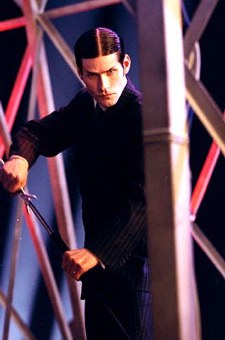cameron diaz movies
|
|
 This son of actor Bruce Glover and former dancer Betty Glover first impressed movie audiences as the nerdy George McFly (a role that he played as both a teenager and at age 45) in the hit "Back to the Future" (1985). Crispin Glover, however, already amassed an impressive resume by that time. The tall, gangly brown-haired player had started in showbiz as a teenager when he was cast in an L.A.-area production of "The Sound of Music" starring Florence Henderson. This son of actor Bruce Glover and former dancer Betty Glover first impressed movie audiences as the nerdy George McFly (a role that he played as both a teenager and at age 45) in the hit "Back to the Future" (1985). Crispin Glover, however, already amassed an impressive resume by that time. The tall, gangly brown-haired player had started in showbiz as a teenager when he was cast in an L.A.-area production of "The Sound of Music" starring Florence Henderson.He quickly graduated to the small screen, appearing alongside the likes of Jill Schoelen and Nicolas Cage (then Nicholas Coppola) in the 1981 ABC variety special "The Best of Times" about the trials and tribulations of being caught between childhood and adulthood. Glover went on to co-star in two pilots for a proposed series called "High School U.S.A." for NBC but neither was picked up by the network.
In 1985, Glover was cast in the fact-based short "The Orkly Kid", about a querulous clown. (The film was later combined with two of director Trent Harris' other shorts and released under the title "The Beaver Trilogy" in 1998). That same year, the actor impressed as Michael J Fox's dad in the first installment of "Back to the Future", although he did not reprise the role in the subsequent sequels.
By that time, Glover was cultivating an eccentric persona with the press off-screen while his onscreen roles (in such less-than-mainstream projects as "Wild at Heart" 1990) fueled the rumor mill. Possessing an iconoclastic streak and unusual "look", he was more of a character player than leading man and he used his oddball physicality well in a variety of independent features including "River's Edge" (1987), in which his performance as the speedy, whacked-out Layne divided critics and audiences. Glover offered a memorable cameo as Andy Warhol in Oliver Stone's "The Doors" (1991) and proved effective as the title character's undertaker pal in "What's Eating Gilbert Grape" (1993).
In 1995, Glover further courted controversy when he undertook legal action against Paramount Pictures for identifying him in the credits of the animated series "Duckman". (Glover contract reportedly called for the use of a pseudonym.) Despite concerns that there might have been retaliation against him, he continued to find employment, landing featured roles in Jim Jarmusch's revisionist Western "Dead Man" and the quasi-biopic "The People vs. Larry Flynt" (both 1996).
At home with unusual and disconcerting characters, Glover wrote and directed the short "What Is It?" (shot in 1998; first screened in 1999) which focused on a group of Down's syndrome adolescents portrayed by real-life Down's syndrome actors. With its strange, often difficult imagery, the short is both surreal and shocking. As with his own performances, audience reactions have been divided, with most registering negative feelings.
Although he has stated a preference for remaining behind the scenes as a writer and director, Glover has not entirely abandoned acting. He offered a fine supporting turn as a nosy reporter in the black comedy "Nurse Betty" and played a part in the big screen version of the seminal 1970s TV series "Charlie's Angels" (both 2000). Additionally, he undertook the lead in "Bartleby" (2001), a film version of Herman Melville's short story "Bartleby the Scrivener", about a legal copyist who creates havoc.
In 2003, Glover was seen as an eerie office clerk, who finds friendship and loyalty in a pack of basement rats, in the thriller feature "Willard." He then rejoined the cast of "Charlie's Angels" (2000) for the sequel "Charlie's Angels: Full Throttle" as the increasingly bizarre Thin Man.
Other Cast
|